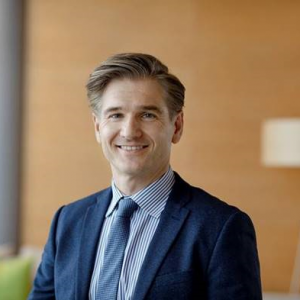Can we rely on AI in healthcare?
5 April / 2019
Artificial Intelligence is about to make a real breakthrough in healthcare. But just how effective and how reliable is the new technology?
“Of course, decisions based on AI can be wrong. But the benefits outweigh the risks,” says Dr. Christian Guttmann, who will lead a highly interesting conversation at Vitalis.
Christian Guttmann, associate professor and researcher in AI, is one of the world’s leading authorities in the field. He is also responsible for AI within Tieto. At Vitalis, he will head the afternoon session Ethics in Artificial Intelligence and Health Care on May 21st. Cory Kidd, MD of Catalia Health, Silicon Valley; Simon Kavanagh, Head of Innovation at Tieto; and Meeri Haataja, advisor to the Finnish Government on AI and ethics, and MD of Saidot, are other heavyweights who will take part in the session.
“They will discuss their experiences, and describe ways they have worked with AI and technology, with special emphasis on the health sector,” explains Christian Guttmann.
Topics to be highlighted during the session will include ways of providing the best-practice clinical information using AI, ways of making it evidence-based and reliable, and procedures for improving the interaction between the patients and AI. The session will be rounded off with a panel discussion.
“That’s when we’ll be featuring a number of case studies and various areas in which AI can be used. Our aim is to present an in-depth picture and make the dialogue as interactive as possible,” says Christian.

Christan Guttman.
“So, in line with that, we’ll encourage the audience to ask questions. Our intention is to challenge the doctors and other health care professionals present. We want to hear about specific examples in which they could see themselves using AI.”
An interesting aspect lies in ways of ensuring that AI always provides the best answers when it comes to diagnosis, treatment plans and medication. Who should the patient trust if the doctor in charge is of a different opinion? Christian Guttmann is confident that AI has a superior capacity to keep up to date on research and developments, and to incorporate and analyse new findings and methods of treatment.
“Some 4,000 new medical science articles are published every week. It’s impossible for an individual doctor to read through that flood of information. But AI can cope.”
But more than that! AI can also structure, evaluate, summarise, and propose a best-practice treatment. The danger that some critics see is that AI processes all the data entered into the system; even data that can be seen as requiring further consideration, or even data that is prejudiced or definitely faulty. In such circumstances, there is a risk that conclusions reached by AI will be of more than doubtful value.
“There’s no question that there is a definite danger. And we can’t close our eyes to it,” says Christian Guttmann.
“There’s no guarantee that AI does everything correctly. In the same way that no doctor or caregiver can currently guarantee that their treatments will be the correct ones.”
He refers to a recent study by Johns Hopkins University claiming that 250,000 people per year in the United States die as a result of medical mistakes, making it the third most common cause of death, after cardiovascular disease and cancer.
“So there’s a lot going on in the care sector that turns out to be faulty. Not intentionally, but because we’re not at all as good as we think we are.”
But Christian believes that the risk of AI making mistakes is comparatively very low. And that the benefits of AI outweigh the risks.
“So it’s now up to us to increase the credibility of AI technology. We have to explain how it works, provide examples of how it can be used and show how it can bring about obvious improvements in healthcare results.”